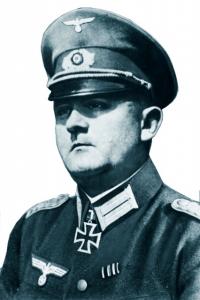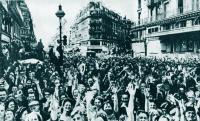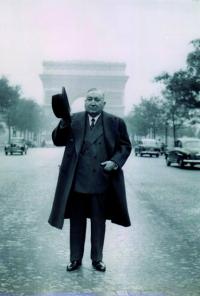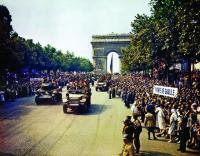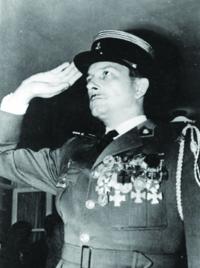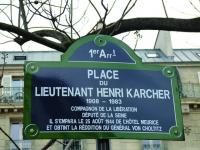“IS PARIS BURNING?” That was the question the German Führer posed this week, seventy years ago, to Colonel-General Alfred Jodl, Chief of the Operations Staff of the Wehrmacht High Command. When General Jodl was unable to assure his Führer that Paris was, indeed, burning, the German dictator called the man whom he had recently appointed Military Governor of the city, General Dietrich von Choltitz. General von Choltitz was a highly decorated lieutenant during the Great War, earning the Iron Cross First & Second Class. He had earned the Knight’s Cross, at Rotterdam, in 1940 and commanded a regiment at the siege of Sevastopol.
On August 1, 1944, General von Choltitz was promoted General of Infantry - a four-star rank. Within the week der Führer named him the Military Governor of Paris, and ordered him to, “...stamp out without pity...” disobedience or terrorism. He was chosen because, on the Eastern Front, he had no compunction against destroying Soviet cities and towns before they were recovered by the Red Army.
General von Choltitz arrived in Paris two days after his appointment. His command consisted of 20,000 German soldiers. During his first week in the French capital, everything was relatively peaceful. On August 15, the last train carrying 2,600 men and women from Paris departed for Buchenwald. That same day, metro workers and police went on strike. That was followed the next day by postal workers, and an order from Hitler that Gestapo and noncombatant administrators evacuate the city. By August 18, workers all across the city were on a general strike and the city had come to a standstill. Meanwhile, Field Marshal Günther von Kluge, Commander-in-Chief, West, had given, “...the order for the neutralization and destruction envisioned for Paris.”
As the Allied armies moved away from the Normandy beaches, the Supreme Allied Commander, American General Dwight D. Eisenhower, decided not to attempt to recapture Paris. He reasoned that a “Stalingrad” type operation to liberate the city would be counterproductive as, at that time, the objective was the capture of Berlin, and the end of the war in Europe, as quickly as possible. Any type of urban warfare to capture the French capital would, undoubtedly, result in its destruction, loss of much time and many lives. However, the American General had not reckoned with French General Charles de Gaulle - self-appointed Chairman of the French Committee of Liberation.
Upon learning that the Germans were placing explosives at strategic points around the city, the President of the Municipal Council of Paris, Pierre-Charles Taittinger, met with General von Choltitz, who informed the Frenchman that, “As an officer, Monsieur Taittinger, you will understand there are certain measures I will have to take in Paris. It is my duty to slow, as much as possible, the advance of the Allies.” The Frenchman - until now a Collaborationist - responded,
“Often it is given a General to destroy - rarely to preserve. Imagine that one day may be given you the opportunity to stand on this balcony again, as a tourist, to look once more on these monuments to our joys, to our sufferings, and be able to say, ‘One day I could have destroyed this, and I preserved it as a gift to humanity.’ General, is not that worth all a conqueror’s glory?”
The General replied, “You are a good advocate for Paris, Monsieur Taittinger. You have done your duty well. Likewise, I, as a German General, must do mine.”
The next day, the German troops moved into position to defend the city and the Communist Resistance began attacking the Germans. Later that evening, General von Choltitz met with Raoul Nordling, who was Counsel-General for Sweden in Paris. (In the movie, Nordling was portrayed by Orson Welles.) The German General was convinced to arrange a truce. First it was just for a few hours, then it was extended indefinitely.
However, the Communists, led by Henri-Rol Tanguy, had not been consulted, and with an eye to postwar control of France, Tanguy ordered his forces to continue the battle, declaring that, “Paris is worth 200,000 dead!” De Gaulle’s representatives met with Tanguy’s representatives in an apartment overlooking the Avenue du Parc-Montsouris, but the two sides were unable to come to any agreement.
In the meantime, de Gaulle’s representatives had approached Eisenhower, once more. Ike now realized that if Paris was destroyed, the Allies would be held as responsible as the Germans, if they did not attempt to save it. So he gave the order for Allied forces to be diverted to Paris, and to be led by the French contingent. Even before he gave the order, the Second (French) Armored Division, commanded by General Philippe Leclerc was racing toward the French capital, 122 miles distant. It arrived on the morning of August 23. By then, the death toll among the resistance forces had risen to 500, while the Germans continued to wire the city with explosives. (General Leclerc was portrayed by Claude Rich).
The Luftwaffe was scheduled to bomb the city on the evening of August 24. Prior to the raid, General von Choltitz visited the Luftwaffe’s Parisian headquarters and demanded that the planned raid be canceled, noting that the raid, “...would kill as many Germans as Parisians!”
As General Leclerc’s Second Armored Division’s Sherman tanks approached Paris, they began to sustain heavy losses at the hands of the German antitank guns. So General Omar Bradley ordered the 4th Infantry Division, commanded by Maj.-Gen. Raymond O. Barton, to support the Frenchmen.
By 9:30 P.M., on August 24, units of General Leclerc’s Second Armored Division were entering the French capital’s center. They were anti-Fascist Republican veterans of the Spanish Civil War in the Division’s Ninth Company. At noon the next day, Parisians rejoiced at the sight of the French Tricolor, once again, atop the Eiffel Tower.
Shortly after 1:00 P.M., on August 25, a French soldier entered General von Choltitz’ office, in the Hôtel Meurice and announced, “I am Lt. Henri Karcher of the Army of General DeGaulle.” General von Choltitz rose from his desk and responded, “General von Choltitz, commander of Greater Paris.” Lt. Karcher then informed the General that, “You are my prisoner.” Lucky for the General, as an angry lynch mob of Parisians awaited him outside the building. He was whisked out the back door to the Prefecture of Police, across the square from the Cathedral of Notre Dame, where he signed a document formally surrendering his command and the city.
At 4:30 P.M., that day, General de Gaulle arrived at General Leclerc’s headquarters at the Hôtel de Ville.
“The City of Light” had been saved - from destruction by the Germans and capture by the Communists. But, at what cost? The delay caused by the diversion of Allied troops, and the increased consumption of fuel, meant that the Allies were unable to reach the German border before winter. It gave the Germans additional time to prepare their forces for an attack through the Ardennes Forest in December - The Battle of the Bulge - which further delayed the war’s end. And during those additional months, the fires in the ovens of the German extermination camps continued to burn and slave-laborers continued to be worked to death.
NEXT: FINLAND SWITCHES
Mr. Wimbrow writes from Ocean City, Maryland, where he practices law representing those persons accused of criminal and traffic offenses, and those persons who have suffered a personal injury through no fault of their own. Mr. Wimbrow can be contacted at
wimbrowlaw@gmail.com.
